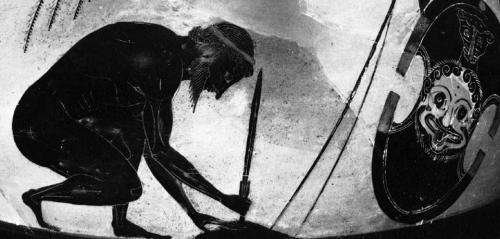Professor probes mental disorders in the ancient world

The examination of mental disorders would seem to be the almost exclusive domain of psychiatrists and psychologists, not humanities scholars. Yet William V. Harris, the William R. Shepherd Professor of History, has spent his time in recent years studying his chosen field—the history of ancient Greece and Rome—through the lens of mental illness.
Harris, director of the Columbia Center for the Ancient Mediterranean, has explored subjects in ancient times ranging from war and imperialism to literacy and economic history. More recently, he began to focus on emotional states, in books such as Restraining Rage: the Ideology of Anger Control in Classical Antiquity in 2002, and Dreams and Experience in Classical Antiquity in 2009. "I've always been interested in psychiatry and psychology, which I see as a quite natural interest for historian," he said.
The examination of mental disorders would seem to be the almost exclusive domain of psychiatrists and psychologists, not humanities scholars. Yet William V. Harris, the William R. Shepherd Professor of History, has spent his time in recent years studying his chosen field—the history of ancient Greece and Rome—through the lens of mental illness.
Harris, director of the Columbia Center for the Ancient Mediterranean, has explored subjects in ancient times ranging from war and imperialism to literacy and economic history. More recently, he began to focus on emotional states, in books such as Restraining Rage: the Ideology of Anger Control in Classical Antiquity in 2002, and Dreams and Experience in Classical Antiquity in 2009. "I've always been interested in psychiatry and psychology, which I see as a quite natural interest for historian," he said.
Chapter titles contributed by many of the conference participants include, "The Early Greek Medical Vocabulary of Insanity" and "Plato on Madness and the Good Life." Harris' own essay focuses on hallucinations, which he chose in part because "describing a hallucination is not an impossible task, it tends to be relatively brief," he said. "Try describing 20 years of depression. That is a very challenging task."
He offers examples of ancient hallucinators, such as Pheidippides, the Athenian courier who saw the god Pan on his famous run to Sparta, which is the inspiration for today's long-distance running event.
Another outcome of his conferences was sorting out ancient terminology and classifications, as he and his collaborators created a sort of Diagnostic and Statistical Manual of Mental Disorders of ancient times. "The names of mental disorders that the very best ancient thinkers have used don't often correspond to anything that exists in the modern world in a neat and tidy way," Harris said. For example, the word "phrenitis" appears in ancient texts to describe illness characterized by delirium, fever and death. Today, some scholars think it refers to encephalitis.
But using modern-day medicine to understand ancient illnesses doesn't always work, Harris said. "There's always a temptation among historians of ancient medicine to do retrospective diagnoses and to say, for example, that so-and-so was a paranoid schizophrenic," he said. "People have found this almost irresistible." But ancient descriptions of cases are seldom complete enough to allow for a retroactive diagnosis, he added.
Nor did the ancients have anything approaching a scientific community of peers. The 2nd century Roman physician and philosopher Galen had colleagues and friends, Harris explained, but nothing comparable to the peer review or statistical support that present-day doctors get.
Despite the addition of the new volume on ancient mental maladies, there are many topics still to be plumbed, such as senility, demonic possession in Christianity and Judaism, and the ancient custom of seeking cures for mental (and other) illnesses by invoking the help of the gods. "I regard this book as a useful publication, but it's a very long way from being the last word on the subject," he said, perusing its cover, which depicts a 16th century woodcut of Galen. "We are left more with an agenda than a whole set of answers."
Provided by Columbia University


















